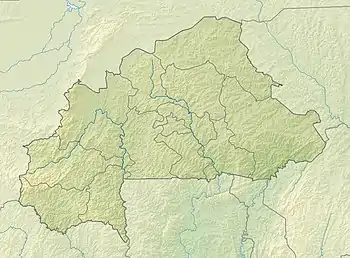| Arli National Park | |
|---|---|
IUCN category IV (habitat/species management area) | |
 Arli National Park with view on the river Arli | |
 | |
| Location | Burkina Faso |
| Nearest city | Diapaga |
| Coordinates | 11°35′N 1°28′E / 11.583°N 1.467°E |
| Area | 760 km2 (290 sq mi) |
| Established | 1954 |
| Part of | Burkinabé part of W-Arly-Pendjari Complex |
| Criteria | Natural: (ix), (x) |
| Reference | 749bis-003 |
| Inscription | 1996 (20th Session) |
| Extensions | 2017 |
| Official name | Parc National d'Arly |
| Designated | 7 October 2009 |
| Reference no. | 1884[1] |
| + | |
Arli National Park, often called Arly,[2] is a national park located in Tapoa Province, southeastern Burkina Faso.[3] It adjoins Benin's Pendjari National Park in the south and the Singou Reserve in the west.
Geography and history

The park is set in 760 km2 (290 sq mi) with a wide variety of habitats, ranging from the gallery forests of the Arli and Pendjari rivers to savanna woodland and sandstone hills of the Gobnangou chain. It is home to around 200 African elephants, 200 hippos and 100 lions. There are also buffaloes, baboons, red and green monkeys, warthogs, and various antelopes, such as the western hartebeest and roan antelope. There are also bushbucks, duikers and waterbuck.[2][4]
The park can be accessed via the N19 highway via Diapaga (in the dry season also via Pama). Arli National Park has several pools, such as Tounga where there is a waterhole and there are two pools which are often visited by up to twenty hippos.
The park was earlier a habitat for the West African wild dog (Lycaon pictus manguensis),[5] although this canid is likely extirpated from the local area due to an expanding human population, and a lack of national protection.
See also
References
- ↑ "Parc National d'Arly". Ramsar Sites Information Service. Retrieved 25 April 2018.
- 1 2 Manson, K.; Knight (2006). "IV: The East". Burkina Faso. Bradt Travel Guides, The Globe Pequot Press Inc. p. 196. ISBN 1841621544. Retrieved June 17, 2008.
- ↑ Ouédraogo, O.; Schmidt, M.; Thiombiano, A.; Hahn, K.; Guinko, S.; Zizka, G. (2011). "Magnoliophyta, Arly National Park, Tapoa, Burkina Faso". Check List. 7 (1): 85–100. doi:10.15560/7.1.85.
- ↑ "UNEP Protected areas". UNEP and WCMC. 1984. Archived from the original on 2007-08-04.
{{cite journal}}: Cite journal requires|journal=(help) - ↑ Michael, C. Hogan (2009-01-31). Stromberg, N. (ed.). "Painted Hunting Dog: Lycaon pictus". GlobalTwitcher.com. Archived from the original on 2010-12-09.
{{cite journal}}: Cite journal requires|journal=(help)
External links